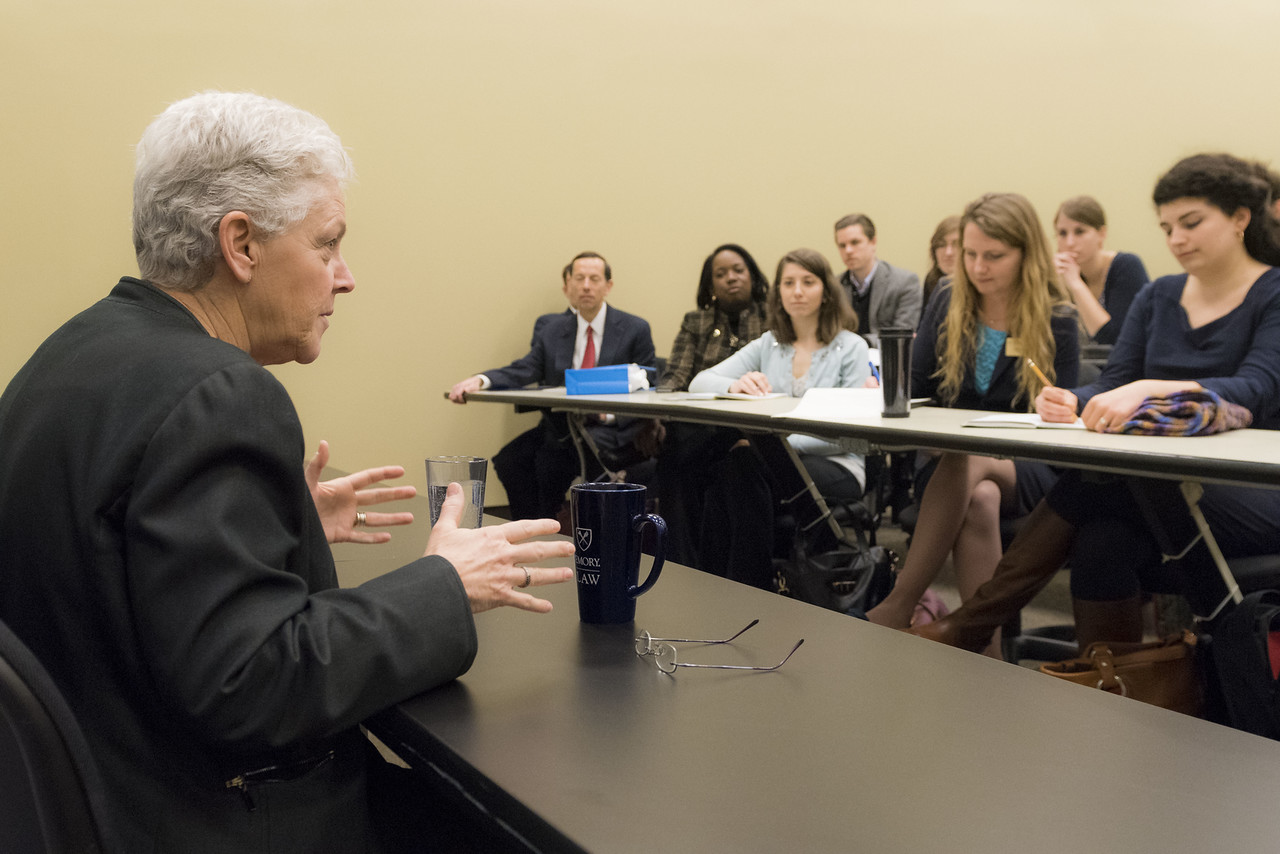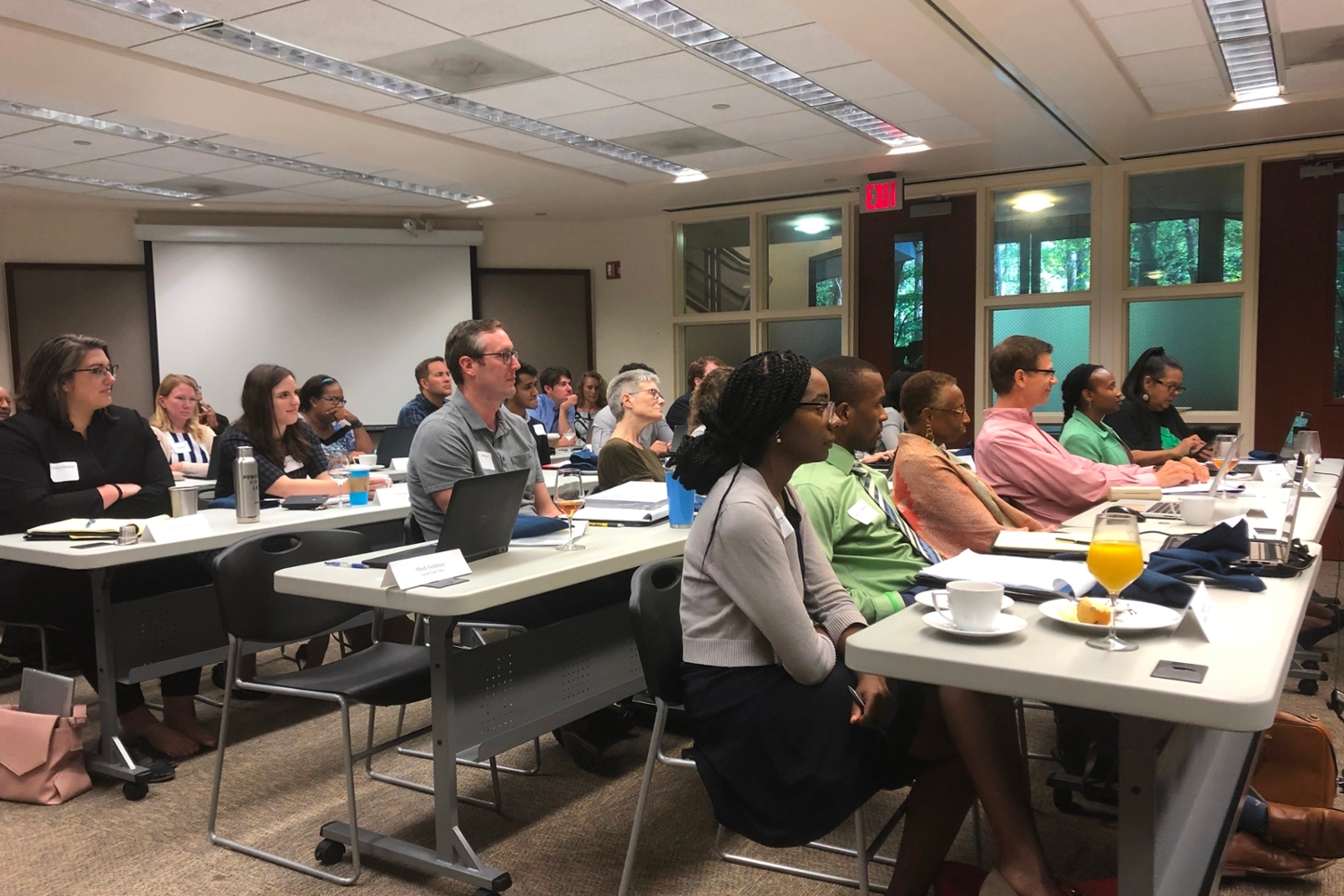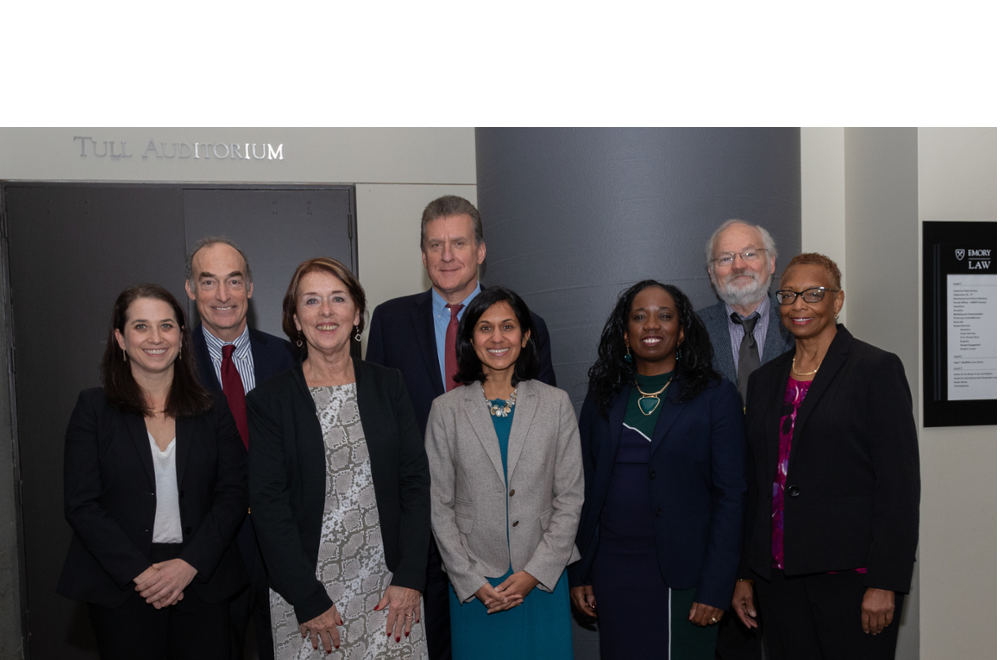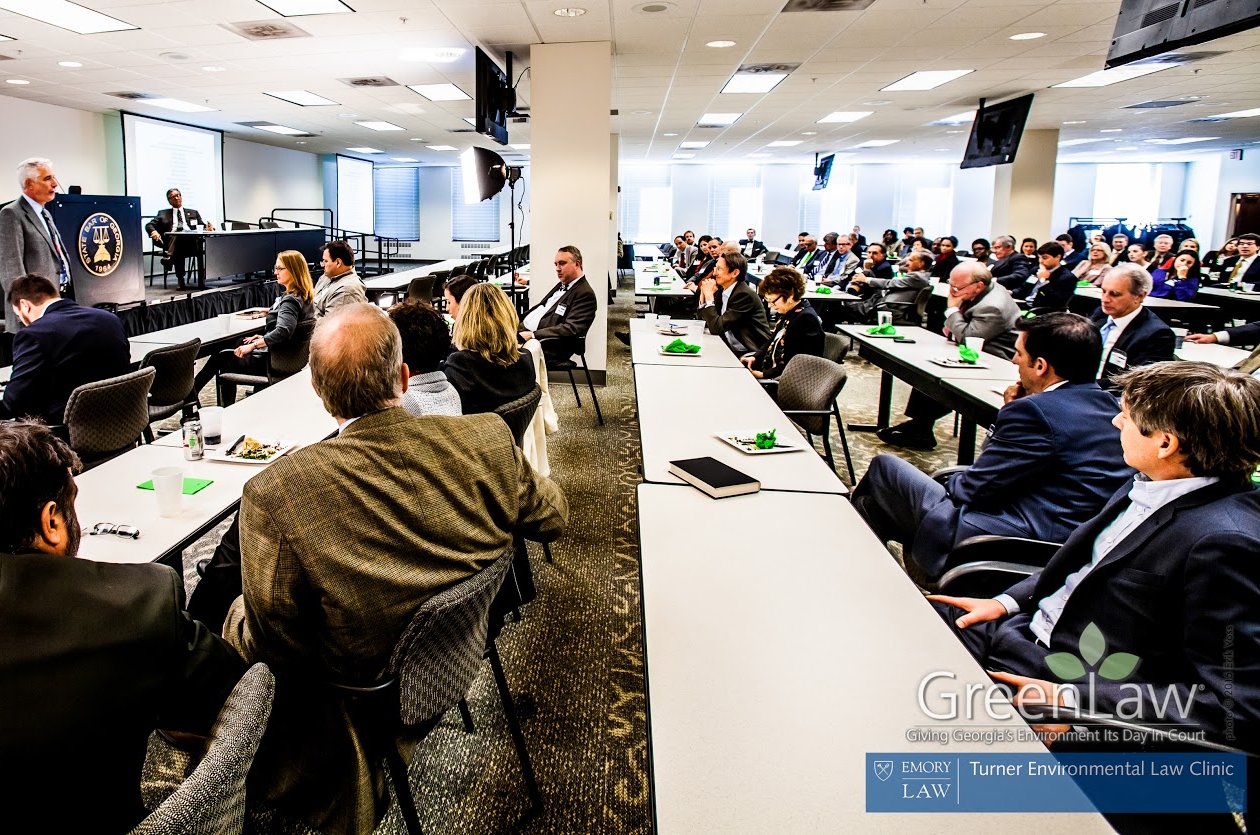Events
The Environmental and Natural Resources Program hosts conferences, workshops, and incredible speakers to explore important issues in environmental law.
Recent Events
The New Asbestos: Discussing Forever Chemicals
On October 15, 2024, we hosted a student-led Q&A with Rob Bilott, an internationally recognized attorney, author, and advocate, to discuss his groundbreaking work uncovering the global impact of PFAS (per- and polyfluoroalkylated substances), also known as "forever chemicals.” Mr. Bilott has led key class actions, personal injury claims, and multi-district litigation, securing billions of dollars for clients harmed by PFAS contamination. Mr. Bilott’s battle with the chemical giant DuPont, chronicled in his book Exposure, inspired the feature film Dark Waters as well as the documentary The Devil We Know and Revealed: How to Poison a Planet.
Previous Events
Sacred Waters Screening
Together with the Okefenokee Protection Alliance, we co-hosted a private screening of Sacred Waters: The Okefenokee in Peril on February 22, 2023. The film "takes viewers into the heart of the Okefenokee National Wildlife Refuge, showcasing its mystical natural beauty, cultural importance, and incredible ecological value. But as the title of the film sets forth, the sacred waters of the Okefenokee are in peril. The threat of a proposed mineral mine near the edge of the Okefenokee looms large, putting the natural integrity of the Swamp at risk.” After the film screening, we asked viewers to take action and urge the Georgia Environmental Protection Division to deny the permit for the proposed mine, and instead preserve the Okefenokee now and for future generations.
Environmental Justice in Atlanta
On February 23, 2022, together with the Civil Rights Society and National Lawyers Guild, we co-hosted a panel discussion with Kate “Tobe” Carson, Ecologist and Community Organizer, Reforest Atlanta; Michael MacMiller, Jr., Just Energy Student and Youth Organizer, Partnership for Southern Equity; MaKara Rumley, Founder and Chief Executive Officer, Hummingbird Firm; and Dr. Eri Saikawa, Associate Professor, Emory College Department of Environmental Sciences, on various environmental justice initiatives in Atlanta. The panelists shared insights on their work and predictions about the Biden Administration’s approach to environmental justice.
Environmental and Corporate Lessons from EarthLink’s General Counsel
On February 9, 2022, together with the Corporate and Business Law Society, we co-hosted a discussion with Sam DeSimone, former General Counsel for Earthlink and current Advisory Board Member of the Turner Environmental Law Clinic. Sam shared stories of the environmental and business challenges he encountered throughout his remarkable legal career, including one that it made its way to the U.S. Supreme Court.
Environmental Racism in the Deep South
On February 18, 2021, together with the Black Law Student Association, Civil Rights Society, and Emory Public Interest Committee, we co-hosted a panel discussion on the intersection of environmental racism, grassroots organizing, and academia. A primary focus of the conversation was solidarity across state lines in the Deep South. Panelists included Mindy Goldstein, Clinical Professor of Law and Director, Turner Environmental Law Clinic and Environmental and Natural Resources Law Program, Emory Law; Nina Morgan, Organizer and Activist at GASP, Inc.; MaKara Rumley, Attorney and Founder, Hummingbird Firm; and Shante Wolfe, Electoral Politics Director, Sunrise Movement.
Dr. Robert Bullard, Father of Environmental Justice
Together with Emory Climate Talks, on December 1, 2020, we co-hosted a conversation about environmental justice with Dr. Robert Bullard. Dr. Bullard is often described as the father of environmental justice. He is an award-winning author of eighteen books that address sustainable development, environmental racism, urban land use, industrial facility siting, community reinvestment, housing, transportation, climate justice, disasters, emergency response, and community resilience, smart growth, and regional equity.
Public Trust Screening
Together with Emory Climate Talks, we co-hosted a private screening of Patagonia's new documentary, PUBLIC TRUST on September 25-30, 2020. The film explores how our public lands are facing unprecedented threats from extractive industries and the politicians in their pockets. Part love letter, part political exposé, PUBLIC TRUST investigates how we arrived at this precarious moment through the examination of three beloved public lands that are particularly at risk—a national monument in the Utah desert, a mine in the Boundary Waters, and oil drilling in the Arctic National Wildlife Refuge—and makes a case for their continued protection.
Then on September 30, we hosted a post-screening discussion with Mr. Avi Garbow, JD, Environmental Advocate with Patagonia. Mr. Garbow has decades of experience in environmental protection law and served as EPA's General Counsel in the Obama Administration.
Environmental Racism Panel
On March 4, 2020, together with the National Lawyer’s Guild, EPIC, and Civil Rights Society, we hosted a panel discussion at Emory Law School on Environmental Racism: What the Law Can Do to Solve Disparate Health Impacts and Inequitable Siting of Polluting Facilities. Panelists included Dr. Eri Saikawa, Associate Professor, Emory College Department of Environmental Sciences; Quentin Pair, former special prosecutor for the Department of Justice’s Environment and Natural Resources Division; and Michael Burns, former senior advisor to the EPA’s Regional Administrator, National Director of College/Underserved Community Partnership Program.
How NEPA Can Help You Get the Results You Want
Together with the Natural Resources Defense Council, Grand Canyon Trust, and the Partnership Project, we hosted a two-day NEPA workshop on October 2-3, 2019, at Emory University. We welcomed community leaders, environmental attorneys, and nonprofit organizations to develop the skills necessary to successfully navigate the NEPA process and promote effective community engagement in federal decisions affecting the environment, health, and safety of communities in Georgia and across the Southeast. Speakers included: Dinah Bear, Former General Counsel, White House Council on Environmental Quality; Sharon Buccino, Senior Director of the Lands and Nature Program, Natural Resources Defense Council; Mindy Goldstein, Clinical Professor of Law and Director, Turner Environmental Law Clinic and Environmental and Natural Resources Law Program, Emory Law; Mary O’Brien, Utah Forests Program Director, Grand Canyon Trust; Stephen Schima, NEPA Director, The Partnership Project; and Hannah Palmer, Writer, Urban Designer, and Leader of Finding the Flint.
The Future of Environmental Law: Where the Next 20 Years Will Lead Us
To celebrate the 20th Anniversary of the Turner Environmental Law Clinic, we hosted a conference at Emory Law on January 18, 2019. The conference included panels on Environmental Law Clinics: The Secret Weapon to Saving Our Environment and The Future of Environmental Law: Frontiers in Advocacy and Protection in a Time of Conflict and Change. It featured panelists including: Wendy Jacobs, Emmett Clinical Professor of Law and Director, Emmett Environmental Law and Policy Clinic, Harvard Law School; Seema Kakade, Assistant Professor of Law and Director, Environmental Law Clinic, University of Maryland School of Law; Patrick Parenteau, Professor of Law and Senior Counsel, Environmental and Natural Resources Law Clinic, Vermont Law School; Mindy Goldstein, Clinical Professor of Law and Director, Turner Environmental Law Clinic and Environmental and Natural Resources Law Program, Emory Law; William W. Buzbee, Professor of Law, Georgetown University Law Center; Gwendolyn Keyes Fleming 93L, Partner, Van Ness Feldman, LLP, and Former EPA Chief of Staff; Michael Sutton, Executive Director, Goldman Environmental Foundation; V. Anne Heard 78L, Executive in Residence, Atlanta Metropolitan State College and Former EPA Region 4 Deputy Regional Administrator; and Lois Gibbs, Executive Director, Center for Health, Environment and Justice.
Sharon Buccino, Senior Director of the Land & Wildlife Program for the Natural Resources Defense Council
Sharon Buccino visited Emory Law School on October 8, 2018. In talk entitled, “ A View from the Frontline: Defending Environmental Protection and the Rule of Law in the Age of Trump,” Sharon shared with students her experience directing a team of lawyers and scientists at NRDC in their fight to ensure public lands and wildlife are protected.
Ferd Hoefner, Founding Member and Senior Strategic Advisor of the National Sustainable Agriculture Coalition
Ferd Hoefner visited Emory Law School on November 6, 2017. As NSAC's senior Washington, D.C. representative, Hoefner shared his experiences advocating for federal policies that support the long-term economic and environmental sustainability of agriculture, natural resources, and rural communities.
Eric Holt-Gimenez, Executive Director of Food First: The Institute for Food and Development Policy
Eric Holt-Gimenez visited Emory on September 27, 2017. He spoke to Emory students and faculty on his new book, Land Justice: Re-imagining Land, Food and Justice in the United States and explored the book's thesis: "to move forward to a more equitable, just, sustainable, and sovereign agriculture system, the various strands of the food movement must come together for land justice."
Gary Nabhan, Nature Writer, Agrarian Activist, and Ethnobiologist
Gary Nabhan, an internationally-celebrated pioneer and creative force in the local food movement and seed saving community, visited Emory University on October 27, 2016. Building upon the work that brought him recognition by Utne Reader, Mother Earth News, New York Times, Bioneers, and Time magazine, he addressed Emory faculty and students in a talk titled “Food, Genes, and Culture.”
Nora Pouillon, Organic Chef and Restaurateur
Nora Pouillon—the pioneering organic chef who opened the first organic restaurant in the U.S., Restaurant Nora, and helped shaped the way we eat in America—visited Emory on March 24, 2016. She spoke with students, faculty, and community members about food regulation, the local food movement, and the importance of sustainable farming. She also signed copies of her newly released memoir, My Organic Life.
Avi Garbow, General Counsel for the U.S. Environmental Protection Agency
Avi Garbow visited Emory Law on February 25, 2016. In a talk titled, “A Conversation with the U.S. EPA’s General Counsel,” Garbow candidly answered questions from Emory students and faculty about the importance of environmental law.
Jan Schlictmann and Rick Kuykendall, Toxic Tort and Environmental Attorneys
Jan Schlictmann and Rick Kuykendall spoke with Emory law students on February 10, 2015. Schlictmann, who was portrayed by John Travolta in 1998’s A Civil Action, first visited the State Bar of Georgia to lecture to Emory law students and approximately 150 prominent attorneys on environmental protection and toxic tort, specifically his two most celebrated cases: Anderson v. Cryovac, on which A Civil Action was based, and the Toms River cancer cluster lawsuit. Kuykendall, a lead litigator in the Deepwater Horizon proceedings, later spoke with students at the law school about his representation of individuals and entities seeking damages in connection with the oil spill in the Gulf of Mexico.
Gina McCarthy, Administrator of the U.S. Environmental Protection Agency
Gina McCarthy visited Emory Law on February 5, 2015. In an intimate question and answer session with students and faculty, McCarthy said that the great thing about visiting Emory was “knowing that there is a next generation who cares about environmental and public health issues.” Gwen Keyes Fleming 93L, McCarthy’s chief of staff, arranged the administrator’s visit through the Turner Environmental Law Clinic. Before visiting the law school, McCarthy toured the campus and visited WaterHub, the wastewater treatment facility that helps Emory reclaim some 300,000 gallons of campus wastewater daily.



